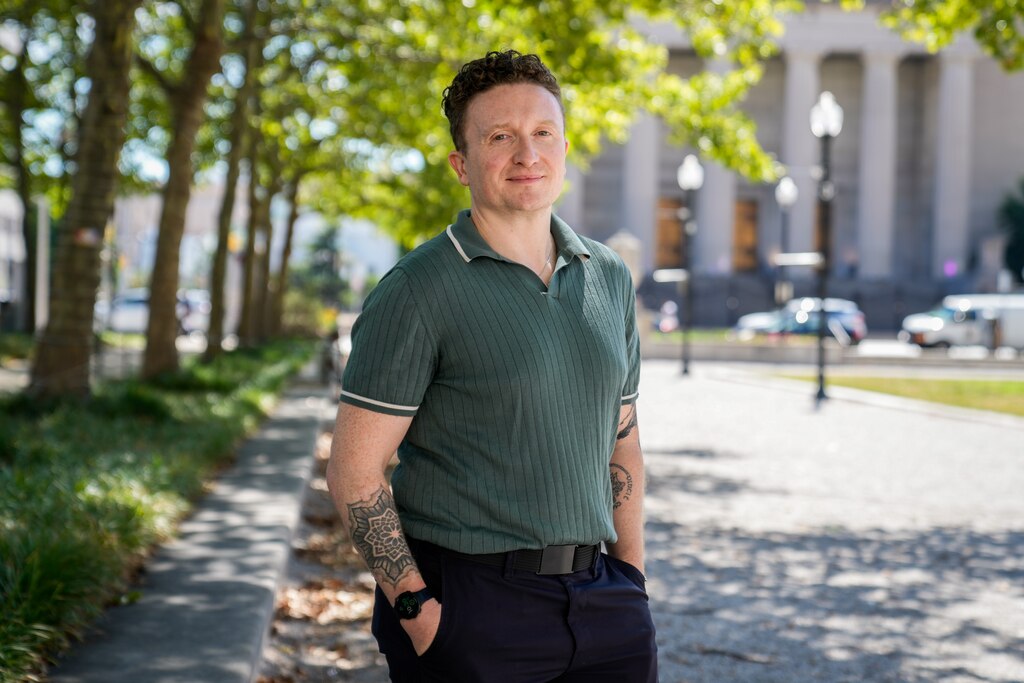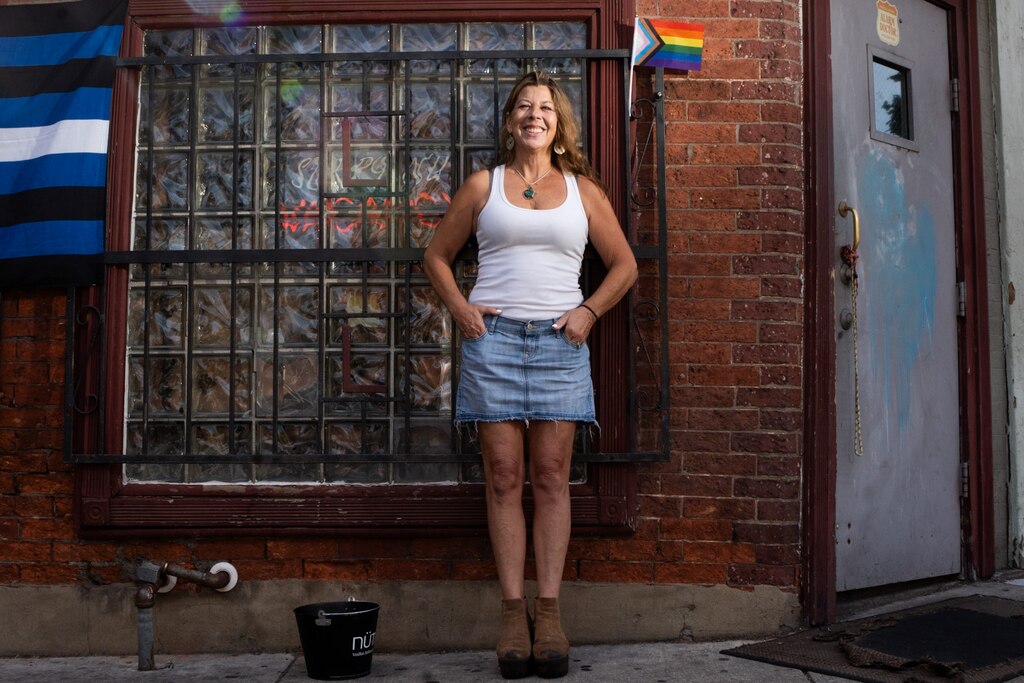P.S. Gear goes on morning runs and swims with his gay workout partner. He regularly attends Sweet Spot, a recurring queer dance party. He’s marched in the Baltimore Pride Parade for the past six years. And he won’t bat an eye when correcting someone who intentionally misgenders someone. He’s also a happily married heterosexual.
The Hampden resident is an ally to the LGBTQIA+ community. Heterosexual is not a part of the LGBQTIA+ acronym, which stands for lesbian, gay, bisexual, queer, transgender, intersex, asexual, but the group is just as important, advocates say.
Allies, those who are not part of the LGBTQIA+ community but support their causes, play an integral part of the success of gender minorities by bridging the acceptance gaps between these groups and heterosexuals. They defend, advocate and advance the causes of a marginalized group that might not always be present to speak for themselves.
But true allyship is more than having a gay friend, according to experts. It involves taking a strong stance on issues that face LGBTQIA+ people, even when facing pushback.
Pride Month in June is a time to bring attention to some of the inequalities and celebrate gender minorities. But LGBTQIA+ people also say that the fight relies heavily on meaningful straight allies who will vote in their interests and be vocal in their defense beyond Pride Month.
“True allyship isn’t about showing up for Pride while also being quiet when LGBTQIA+ issues cross your dinner tables, your desks and your ballots,” said Derek Lindsey, interim board chair at Blaq Equity Baltimore. “Silence makes us complicit and true allyship starts with speaking up for the community at every opportunity, listening to and amplifying LGBTQIA+ voices, and actively working toward the protection of LGBTQIA+ people, even when it’s difficult.”
Kevin Naff, editor in chief of The Washington Blade, credits allies with helping gender minorities “so much so fast” in recent years.
“The polling on marriage equality in D.C. and Maryland didn’t shift until Black pastors joined the fight. Immigrant rights groups, labor unions, and others marched alongside us in that fight as well,” said Naff, who lives in Harbor East. “Our allies play a critical role in educating and expanding acceptance and understanding.”
Straight allies have helped Kelly Cross and his husband Mateusz Rozanski feel accepted in their gay marriage. When the couple celebrated their 11th anniversary they received a morning text message of congratulations from straight neighbors.
“I believe that you can only be an effective, confident human being when you aren’t hiding something fundamental about yourself,” Cross said. “Those anniversary wishes this morning reminded me that people providing real friendship is also allyship.”

Gear, 41, said he began his allyship in 2008 when working for political activist group Drinking Liberally during President Barack Obama’s first presidential campaign. He spent a lot of time in bars planning to volunteer for Obama’s campaign. During that time, Gear was able to unpack Obama’s reversed stance on gay marriage as well as “navigating” all the diverse thoughts of his new colleagues — some who were members of the LGBTQIA+ community.
“It was then I learned what it meant to be an ally: shut up and listen, do my research, and how to make my voice heard when it mattered,” he said.
Gear has become a better ally over the years. He rarely gets in confrontations with people about LGQBTIA+ issues — in part because he chooses to surround himself with open-minded individuals.

As the mother of a lesbian daughter and daughter of a gay father, being an LGBTQIA+ ally is a no-brainer for Karen Dugan, the owner of Dugan Home Design who also works as a bartender at Leon’s, one of the nation’s oldest continually open gay bars. Dugan, whose best friend is a gay man, said having a father come out as gay when she was 11 made her just assume everyone had a gay parent or relative.
“I have been asked a bunch of times if I think my daughter is going to grow out of being gay,” said the 55-year-old Bowleys Quarters resident said. “I simply ask them if they are right or left-handed and then asking if they think they will grow out of it.”
As LGBTQIA+ rights continue to be under attack, straight support is even more important, say community leaders.
“It is vital to ensure that these individuals do not feel alienated, especially given that many grow up in a binary world where they often feel unsupported and as though they do not belong,” said Tramour Wilson, senior director of Advocacy and Community Engagement at The Pride Center of Maryland. “True allyship is essential as it serves as a reminder that everyone is part of a larger system and world.”
Some people may fear publicly identifying as allies or feel uncertain about how to effectively be one, Wilson said. But being an ally can encourage others to do the same.
“Public displays of allyship can inspire others to join the movement without fear,” Wilson said.
One of the best ways allies can move the needle is when they’re with family, friends, or at work, and conversation is either hostile or not inclusive of the LGBTQIA+ community, said Byron E. Macfarlane, register of wills for Howard County, who is also gay.
“Those are places where we may feel our professional or our familial standing is at risk if we challenge a prejudicial policy or viewpoint,” Mcfarlane said. “Will I be demoted or fired or will I be exiled or disinherited if I stand up and say something? An ally actually may be a more effective advocate for an LGBTQIA+ colleague or family member because they’re not fighting for themselves, but for selflessly for others.”
Both Gear and Dugan agreed that it’s simply not enough to speak up for the LGBTQIA+ community — they also said keeping that community’s rights in mind shapes how they vote.
“Ensuring any life and lifestyle (which does not seek to harm anyone) is protected from bigotry and the our assumed & biased social caste system ensures our society is strong, resilient, and inclusive,” Gear said.
How to be an ally
Rakeah Glass, program manager at The Institute for Equity, Diversity, and Inclusion/Grants Management, which is part of Chase Brexton Health Care, offers these following tips for allies:
1. Learn
Remain open to learning more about the LGBTQIA+ community through reading and speaking to people within the community.
2. Listen
Maintain an open heart and mind when in the presence of those whom you wish to learn more about.
3. Speak Up
As you learn more, when you hear inaccuracies, calmly correct fallacies stated as fact and speak up against derogatory statements.
4. Get Involved
This step will help with steps 1-3. There are several organizations willing to welcome you as you expand your knowledge and join the fight for social change. A good place to start is Chase Brexton Health Care’s Resource page and Chase Brexton’s Center for LGBTQ Health Equity.





Comments
Welcome to The Banner's subscriber-only commenting community. Please review our community guidelines.